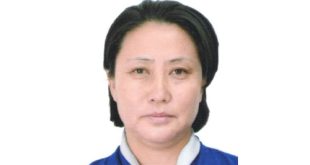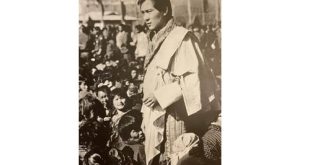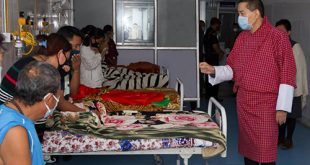
By Lyonpo Sonam Tobgye
On 4th September 2001, His Majesty King Jigme Singye Wangchuck commanded the Council of Ministers, the Chief Justice of Bhutan, the Speaker of the National Assembly, and the Chairperson of the Royal Advisory Council to initiate the drafting of a Constitution for the Kingdom of Bhutan. On that day, His Majesty, in a written command, directed that the Constitution should encompass the following constitutional principles:
“Introduction/Preamble, Fundamental Rights and Duties, Articles relating to the role and responsibilities of His Majesty the King, Articles relating to the Executive, Articles relating to the Legislature (Reforms and re-organization of the National Assembly and the Lodroe Tshogdue), Local Governments (Dzongkhag Yargay Tshogchungs (DYT) and Gewog Yargay Tshogchungs (GYT)), Articles relating to the Judiciary including the establishment of the Supreme Court of Bhutan, Articles covering the Auditor General, Anti-Corruption Commission, Royal Civil Service Commission etc.; Other Articles for the Constitution which are necessary and beneficial to the country, government and people; and Provisions for Amendment of the Constitution.”
Members of the Constitution Drafting Committee, 2001
The Constitution Drafting Committee was composed of thirty-nine members. They included representatives from the twenty dzongkhags, two members from the Dratshang, the Speaker of the National Assembly, seven members from the Royal Advisory Council, three members from the Judiciary, and six from the government.
There were twenty peoples’ representatives.
Bhutan starts drafting a written Constitution in 2001
Following the Royal Decree issued by His Majesty in September, the government inaugurated the drafting of a Constitution for the Kingdom of Bhutan with a traditional ceremony in Tashichhodzong on 30th November 2001 in the presence of His Majesty the King.
His Majesty, who briefed members of the Drafting Committee, said that the basic purpose of the Constitution was to ensure the sovereignty and security of the nation and the well-being of the Bhutanese people for all time to come. The political system of the country must evolve so that the people would continue to enjoy peace and prosperity, justice, and the fundamental rights which have always been enshrined in the Bhutanese system.
“It is important for all of us today to look into the future and to take the necessary steps to shape the destiny of our country,” His Majesty said, and further added, “Bhutan must move with the times to ensure that the nation not only overcomes all internal and external threats, but continues to prosper in an atmosphere of peace and stability.”
His Majesty emphasised the need for a Constitution to establish a dynamic system of governance which would uphold the true principles of democracy. The Constitution must go beyond mere words and become the golden pillar which will support and enable the political system to safeguard the sovereignty of the country and the rights of the people.
His Majesty the King reminded the members of the drafting committee that he had always maintained that the destiny of the nation lay in the hands of the people. It was, therefore, important to establish a political system which will enable the Bhutanese people to shoulder this sacred responsibility.
His Majesty said that Bhutan should not be deterred by the fact that democratic political systems did not work in some countries. Bhutan was in a unique position, with the time and opportunity, to develop a system of governance which would be in the interest of the Bhutanese people and the country. “What is most important is that we must trust our own people,” said His Majesty.
“We must have full faith in the integrity of our people, their capability, and their commitment an loyalty right to Palden Drukpa.”
His Majesty said that the Constitution must embody the expectations and aspirations of the people. It must draw on the wisdom of the existing system, the existing laws, and the lessons learned by other countries around the world.
Meetings of the Drafting Committee 2001
Pursuant to the inaugural ceremony, the First Constitutional Drafting session was convened from 30th November to 14th December 2001 at the Royal Banquet Hall, Thimphu.
The committee deliberated on the right to freedom of thought, conscience and speech for the first three days. Commencing from the fourth day, the Committee discussed the provisions relating to the Articles provided by His Majesty in His Command dated 4th September 2001.
The Second Constitutional Drafting Session was convened at Punakha, as it is the place where Zhabdrung Ngawang Namgyal introduced the glorious reign of Palden Drukpa. It was followed by the introduction of People’s Monarchical system in the Kingdom. The meeting was held from 4th to 8th February 2002, which coincided with the Puna Dromchhe. The Committee deliberated on the structure of the Constitution, separation of powers, constitutional bodies, rights, responsibilities, social goals, press freedom, and Local Government, building on the first meeting’s discussions.
The Third Constitutional Drafting Session was convened from 27th March to 11th April 2002 at the Royal Banquet Hall. The draft from the second session was reviewed and debated in the context of His Majesty’s speeches and Bhutan’s laws.
The Fourth Session was conducted from 10th to 19th June 2002 at the Royal Banquet Hall to review the refinements and evolutions from the draft of the third session.
The Fifth Constitutional Drafting Session was held from 9th to 18th October 2002 in Bumthang. Bumthang was chosen because it is both a religious and historic center of the country. Symbolically and spiritually, it accords recognition to the rise of the Wangchuck Dynasty and combination of Ka Nying Zung Jug. The meeting in front of the holy Guru Rinpoche set the spiritual atmosphere to imbue our work with the spiritual blessing. The members deliberated on various issues and further improved the draft.
The Sixth Session met from 23rd to 25th November 2002 in Thimphu for further discussions on the draft.
Important Role of the Judiciary
His Majesty addressed the Judiciary, stating that the drafting of the Constitution was not the Committee’s task alone, but required broad-based participation. The draft would be reviewed by government officials and the people in the dzongkhags and gewogs, and international expert views would be sought. He emphasized that the Judiciary would ultimately be the guardian of the Constitution and the rights it guarantees.
First Draft submitted to His Majesty
The first draft of the Constitution of the Kingdom of Bhutan was formally submitted to His Majesty in an auspicious ceremony at the Throne Room of Tashichhodzong on 9th December 2002.
His Majesty noted that the draft had been drawn up by the Committee completely independent of all influences. His Majesty said that he had deliberately avoided any involvement in the drafting process as the Constitution would have to be finalised jointly by the government, the people, and the King.
His Majesty said that a several institutions, legislation, and systems would need to be in place for the Constitution to be effective. For example, with more than 3,000 representatives required to be elected to the DYT and GYT, it would provide a good opportunity for an election commission to gain experience in the electoral process.
The recent election of the gups had proved that it was necessary to update the national census records to avoid unnecessary problems for eligible voters.
His Majesty said that the Constitution must provide the legislative framework for good governance and democratic rule. It was important to solve the security problem and ensure stability in the Kingdom before introducing major political changes with the enactment of the Constitution. It was, therefore, critical that the country had a strong and stable government.
His Majesty informed the committee members that he was aware of the concerns and misgivings of the Bhutanese people over the negative impact of introducing such major political reforms when the nation was enjoying an era of peace and prosperity. The people were expressing their doubts about the wisdom of introducing a Constitution and changing a stable and time-tested system.
His Majesty said that he understood the concerns of the people, who had seen the negative impact of democratic rule elsewhere. People believed that the political intrigues of democracy at different levels allowed the growth of corruption and many other problems. Such patterns were visible everywhere.
His Majesty said that he had also heard the scepticism of foreign observers who believed that Bhutan and the Bhutanese people lacked the political experience and maturity to support democratic rule. That was also understandable because foreigners were not aware of the continuous evolution that had been taking place within the Bhutanese system.
His Majesty said that the introduction of the Constitution of Bhutan was not an ad hoc or sudden move. It was part of a carefully planned process of political reformation. The rest of the world may not be aware of it but His Majesty reminded the committee members that today’s generation of Bhutanese had been through 27 years of political evolution at the central, dzongkhag, and gewog levels.
It was natural that political changes would be accompanied by numerous problems, His Majesty said. But it was important to go ahead and overcome the challenges.
“The Constitution of our country must fulfill the aspirations of our people and it must be relevant and beneficial for the best interests of the nation,” His Majesty said. “It should not merely be transplanted from elsewhere.
Responding to concerns about outside influences, His Majesty advised that it was important to study other constitutions, to seek international expertise, and adapt what was relevant for Bhutan.
His Majesty expressed his confidence that, after three decades of political experience, the Bhutanese people had the political maturity and sense of responsibility to be able to look ahead, to share the burden of state, be capable of good governance, and to safeguard the sovereignty of the country. It was vital that the Bhutanese people remained united in their thoughts and actions and in their dedication and commitment to the nation.
“ I have been saying, for 30 years, that the destiny of the nation lies in the hands of the people,” His Majesty said. “I have always made it clear that the people are more important than the King. We cannot leave the future of the country in the hands of one person. These are not mere words. The Constitution will be the fulfilment of our country’s destiny being placed in the hands of our people.”
His Majesty the King advised the committee members that it was important to establish clear rules and regulations governing the King and the royal family.
The Constitution must not be drawn up to benefit the King. It was more important to ensure that the King would best be able to serve the Constitution.
His Majesty the King expressed his deep appreciation and tashi delek to the Chief Justice, the Speaker of the National Assembly, representatives of the clergy, the Royal Advisory Council, the people’s representatives of the 20 dzongkhags, and the representatives of the thrimkhang and government for the successful completion of the first draft Constitution of the Kingdom of Bhutan.
His Majesty gave the draft Constitution, which would now be widely debated, to the Prime Minister, Lyonpo Kinzang Dorji. His Majesty expressed his confidence that, as Bhutan faced the challenges of the future, the Bhutanese people had the integrity, the perception, and the capability to carry out the important responsibility of shaping the destiny of the nation.
His Majesty, thanked Mr K.K. Venugopal, in a letter 27th October 2004 in helping in the drafting process.
Correction of the Draft in 2004
His Majesty devoted considerable time in improving the document and meticulously studied every word, phrase and sentence. Thereafter, His Majesty sent the revised draft to the Chairperson of the Constitution Drafting Committee on 15th October 2004 to be reviewed by the Legal Committee formed under the Committee.
The process was participatory, with General Vestop Namgyel assisting. General’s stupendous services without public acclaim and recognition are extraordinary.
His Majesty sent the draft to the Council of Ministers on 1st November 2004. A copy with corrections was submitted back to His Majesty and received by the Committee on 19th January 2005. The Legal Committee incorporated the changes, and a special session of the Council of Ministers held the last formal discussion on 21st March 2005.
Draft Constitution goes Nation-wide in 2005
Representatives of the Dratshang, the 20 dzongkhags, the civil service, the educational institutions, the courts, the armed forces, and the business community received copies of the draft Constitution for nation-wide distribution on 26th March 2005. Following a symbolic tradition that was established by Zhabdrung Ngawang Namgyal in the 17th Century, the Chief Justice handed over the first copies to representatives from Samdrup Jongkhar in the east, Chukha in the south, Samtse in the west, and Gasa in the north.
On the command of His Majesty the King, the draft Constitution was launched online on the day it was released to the public on 26th March 2005. There had been many substantive and positive responses from the international community.
Simplifying the Constitution in Dzongkha
Upon receiving feedback that the Dzongkha version of the draft Constitution was difficult to understand, His Majesty commanded the Prime Minister, Lyonpo Yeshey Zimba, and the Chief Justice, Lyonpo Sonam Tobgye, on 20th April 2005 that the language should be simplified without diluting the contents. The revised, simplified version was distributed to all households and institutions on 18th August 2005.
His Majesty Briefs in the Judiciary System
On 20th May 2005, following the annual judiciary conference, His Majesty briefed the judiciary on the Constitution and stressed the need for public involvement in its finalization.
A Constitution for the Future of Bhutan
Overwhelmed by the magnitude of the implications symbolised by the Kingdom’s first written Constitution, the residents of the nation’s capital entered a new chapter in Bhutanese history as they gathered around His Majesty for a public discussion on the draft. Apart from specific responses on the 34 articles, a palpable emotion was their deep concern about a future that remained, to many, unfathomable.
His Majesty reminded the gathering that the Constitution was being adopted to introduce a new system of governance, a parliamentary democracy, to ensure the sovereignty and security of the Kingdom and the well-being of the Bhutanese people for all time to come.
His Majesty said that in establishing a Constitution, it was important to ensure that it would be relevant for 100 years and beyond. While consulting with the Bhutanese people every effort must be made to try and ensure that the Constitution would be relevant for at least 50 years. It was important for the people to discuss and finalise a Constitution that would benefit the country. Bhutan had the unique opportunity to draw up a Constitution that would benefit the people for generations to come.
Dzongkhag Consultations Ends, the Future Begins
From the first consultation in Thimphu to the final meeting in Trongsa, His Majesty the King and His Royal Highness (HRH) the Trongsa Penlop Jigme Khesar Namgyel Wangchuck traversed the country to hold discussions on the draft Constitution with the people in gatherings big and small.
His Majesty commenced the process of public consultation from Thimphu on 26th October 2005. He personally participated in public consultation in Thimphu, Haa, Paro, Punakha, Wangdue Phodrang, Mongar and Trashigang. Similarly, HRH the Trongsa conducted his first public consultation in Lhuentse on 24th December 2005. He covered thirteen dzongkhags; Lhuentse, Trashi Yangtse, Pemagatshel, Dagana, Tsirang, Sarpang, Chukha, Samtse, Samdrup Jongkhar, Zhemgang, Gasa, Bumthang and Trongsa.
HRH concluded the public consultation in Trongsa on 24th May 2006. The meetings have been an ironical reminder that, as the powers are devolved and political parties are looked upon to carry Bhutan into the future, the people continue to have undoubted faith in and share a special relationship with the very institution trying to devolve its powers, the Monarchy.
HRH the Trongsa Penlop told the people their duty was only beginning with the consultations. He stated that the Constitution symbolized the strong foundation built by His Majesty the Fourth King over 33 years. He emphasized leadership is about the future and building future leaders. He urged the youth to be better than previous generations and to compare Bhutan to successful nations globally. HRH expressed gratitude to past generations and the Drafting Committee, stating the future now belongs to the youth and depends on their will and commitment.
Parliamentary Debate 2008
The first elected members of Parliament discussed and debated the provisions of the draft Constitution one-by-one. There were about 192 interventions by the Parliamentarians during the 10 days parliamentary debate on the draft Constitution, and the Chairperson clarified about 60 times excluding remarks by the Hon’ble Speaker. The parliamentary debates were televised.
The Adoption of the Constitution
On 18th July 2008, His Majesty The King Jigme Khesar Namgyel Wangchuck adopted the Constitution. He expressed gratitude to His Majesty the Fourth Druk Gyalpo for building a strong nation and securing people’s hopes through democratization and Gross National Happiness. He stated the Constitution is the profound achievement of generations of service and emphasized that understanding duties is more important than exercising powers. He affirmed that the Constitution, blessed by every citizen, is the people’s Constitution, and he affixed to it the hopes and prayers of the people.
His Majesty The King said, “This Constitution was placed before the people of the 20 dzongkhags by the King. Each word has earned its sacred place with the blessings of every citizen in our nation. This is the people’s Constitution. And today, through this, my Hand and Seal, I affix on to the Constitution of the Kingdom of Bhutan, the hopes and prayers of my People.”
The writer is the former Chief Justice and the Chairperson of the Drafting Committee for the Constitution of the Kingdom of Bhutan.
 The Bhutanese Leading the way.
The Bhutanese Leading the way.




